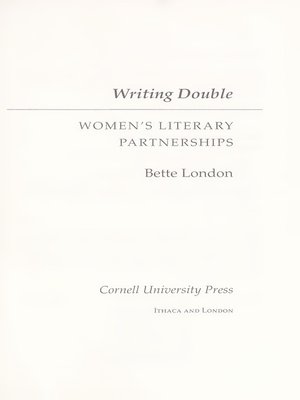
Sign up to save your library
With an OverDrive account, you can save your favorite libraries for at-a-glance information about availability. Find out more about OverDrive accounts.
Find this title in Libby, the library reading app by OverDrive.



Search for a digital library with this title
Title found at these libraries:
| Loading... |
Although Roland Barthes and Michel Foucault announced the death of the author several decades ago, critics have been slow to abandon the idea of the solitary writer. Bette London maintains that this notion has blinded us to the reality that writing is seldom an individual activity and that it has led us to overlook both the frequency with which women authors have worked together and the significance of their collaborative undertakings as a form of professional activity. In Writing Double, the first full-length treatment of women's literary partnerships, she goes to the heart of issues surrounding authorial identity.
What is an author? Which forms of authorship are sanctioned and which forms marginalized? Which of these forms have particularly attracted women? Such questions are central to London's analysis of the challenge that women's literary collaboration presents to accepted notions of authorship. Focusing on British texts from the nineteenth and twentieth centuries, she considers a fascinating variety of works by largely noncanonical, and in some instances highly unconventional, authors—from the enormously popular novels composed by writing teams at the turn of the century, to the Brontë juvenilia and the occult scripts of Georgie Yeats and W. B. Yeats, to automatic writings produced by mediums purporting to be in communication with the spirit world.
|Although Roland Barthes and Michel Foucault announced the death of the author several decades ago, critics have been slow to abandon the idea of the solitary writer. Bette London maintains that this notion has blinded us to the reality that writing is seldom an individual activity and that it has led us to overlook both the frequency with which women authors have worked together and the significance of their collaborative undertakings as a form of professional activity. In Writing Double, the first full-length treatment of women's literary partnerships, she goes to the heart of issues surrounding authorial identity. What is an author? Which forms of authorship are sanctioned and which forms marginalized? Which of these forms have particularly attracted women? Such questions are central to London's analysis of the challenge that women's literary collaboration presents to accepted notions of authorship. Focusing on British texts from the nineteenth and twentieth centuries, she considers a fascinating variety of works by largely noncanonical, and in some instances highly unconventional, authors—from the enormously popular novels composed by writing teams at the turn of the century, to the Brontë juvenilia and the occult scripts of Georgie Yeats and W. B. Yeats, to automatic writings produced by mediums purporting to be in communication with the spirit world.






